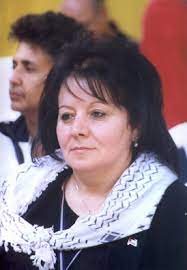
Few are those whose name, work, struggle, creativity, and distinction become inseparable from the name of their homeland and its leader—an indivisible unity, where each exists for the other, as lover and beloved, as deity and devotee, as the source and the sustenance. Neither can exist without the other; they form the essence of a sacred trinity, dispersed yet one. Toward them, necks crane in longing, ears listen in rapture, and eyes remain transfixed in wonder. A fourth voice rises in hymns of adoration, shaking the throne of heaven and awakening the Lord of all, who then descends, the ardent knight, taking his beloved Rabi’a by the hand and leading her across the vast plains, hills, and deserts of the homeland, whispering to her the song he has always sung:
“What might have been, what life of abundance awaited us, had we lived side by side in this boundless homeland? What joy would have been ours, raising six children—flowers of this wondrous world? If only you, if only I, had embraced the soil of our land and dissolved into its depths.”
Thus, from the moment of her birth, Hanan Awwad, the daughter of Jerusalem, was destined to be Palestine’s Damask Rose, the Rabi’a of Palestine—the madwoman of its cause, the enraptured devotee of its one and only knight. To them, she dedicated her life; through them, she attained sanctity.
In the opening pages of her autobiography, Memory of Narcissistic Opulence (Everything Library, Haifa, 2021), Hanan Awwad recounts the details of her childhood and the course of her life within a loving family. Her father, a remarkable man, worked tirelessly, providing financial stability, a dignified life, and boundless freedom for his family. He was generous with his wealth, offering it to those in need and contributing to various national resistance efforts. Her mother, always smiling, showered her with unwavering prayers, entrusting her to divine care. Her siblings, each receiving a share of her affection, formed an integral part of her world.
She reminisces about her school years, from primary to secondary education, until the eruption of a great upheaval—the occupation of Jerusalem and the entirety of the West Bank, Gaza, the Syrian Golan Heights, and Egypt’s Sinai Peninsula by the Israeli army in June 1967. She recalls the profound shock, the searing wound it left within her, and her defiant response to this catastrophic event. Alongside her participation in volunteer work and various national initiatives, Hanan, encouraged by her parents, pursued higher education with unwavering determination.
She simultaneously studied at the University of Beirut and Al-Azhar University in Cairo, earning her first degree. Later, when the occupation authorities forbade her from leaving Jerusalem, she enrolled in the Hebrew University of Jerusalem for her master’s studies. Eventually, she pursued her doctorate at Oxford University in the UK and McGill University in Canada.
Hanan’s voice resonated in the national press, where she had her own weekly column, articulating her opinions and insights on various issues. Her refined language and eloquent style captivated readers from all walks of life. She also distinguished herself through poetry—her verses, rich in spiritual mysticism, drew the attention of critics and literary figures, heralding the arrival of a poetess whose vision and artistry bore a unique message.
She consecrated her life, her being, and her intellect to the knight she awaited—the redeemer, the liberator, the one who would lead her to the celestial paradise of Jerusalem, where the lover and the beloved dissolve into oneness, where passion and homeland merge into the promised paradise called Palestine.
During her studies, Hanan Awwad was deeply committed to participating in every student-led initiative that served her national cause. She took part in numerous conferences and represented Palestine in dozens of Arab and international gatherings.
Upon completing her education and earning her doctorate, she pursued an academic career, teaching at universities in the West Bank and Arab Jerusalem. At the same time, she dedicated herself fully to political work, serving as Palestine’s representative and a personal envoy of President Yasser Arafat in international arenas.
Hanan Awwad, as I know her, is unlike any other woman. From a young age, she carved out two unwavering paths in her life: a deep love for her homeland and an unyielding devotion to her destined knight.
Since completing high school and setting forth on her life’s journey, nothing has preoccupied her but Palestine and her beloved warrior. She consecrated her existence, immersing herself in a sacred devotion akin to the asceticism of a mystic, embodying the spirit of Rabi’a al-Adawiyya—but as Palestine’s Rabi’a, striving for complete unity with both her homeland and the knight of all knights, the awaited redeemer, the longed-for liberator of the captive paradise. In this dream of liberation, he would finally reunite with his beloved Rabi’a, and together, they would bask in the **glory of a freed land—**the land called Palestine.
In her 476-page memoir, written in a relatively small font, Hanan leads the reader through the intricate layers of her life, her intellect, and her aspirations. With remarkable candor, she unveils the full extent of her journey, offering an authentic, firsthand account backed by the testimonies of prominent figures known through media and history—individuals who were present, witnesses, and participants in the very events she recounts.
Hanan divided herself between multiple spheres, preparing for confrontations and experiences on all the fronts she had chosen for her life:
1. Family
Born and raised in a privileged and affluent household, Hanan was nurtured in an environment where national loyalty and the love of Palestine took precedence over all else. Her father, a cultured and patriotic man, deeply cherished his family, supporting them wholeheartedly in their pursuit of knowledge and higher education. He gave them his love and unwavering trust, allowing them to navigate their own paths in life and in struggle, all while standing firmly behind them, offering his encouragement and every resource they needed.
Hanan, in particular, held a special place in her father’s heart—he blessed every step she took, stood by her side, and remained her guardian until the final moments of his life. She was equally adored by her mother, siblings, and extended family.
2. Academic Excellence
Hanan excelled in every stage of her education, distinguishing herself as an outstanding student capable of enrolling in multiple universities simultaneously. She pursued her undergraduate studies at both Beirut Arab University and Al-Azhar University, earning her B.A. degree. Later, she continued her academic journey at Oxford University in the UK and McGill University in Canada, where she obtained her doctorate.
When Israeli occupation authorities barred her from traveling, she enrolled at the Hebrew University of Jerusalem, earning a master’s degree in Arabic language. During this period, I had the privilege of being her classmate in Jerusalem as she pursued her M.A.
3. Professional and Scholarly Recognition
Hanan triumphed in every stage of her academic career, gaining the respect and admiration of her professors. She developed meaningful friendships with them, earning their deep appreciation for her intellect, determination, and excellence.
Her Work in Journalism and Unique Poetic Creativity
Hanan Awwad’s exceptional talents, intelligence, sharp intuition, and natural gift for language—particularly her mastery of Arabic in all its richness, along with her fluency in several foreign languages—set her apart both as a poet and as a journalist. She became a force to be reckoned with, her words carrying weight in the public sphere and among policymakers. Her name resonated in cultural and political circles, drawing the attention of intellectuals, decision-makers, and the public alike.
Her Relationship with Palestinian Icons
Through her intellect, exceptional abilities, and continuous success, Hanan Awwad became a close confidante of numerous Palestinian and cultural figures, most notably President Yasser Arafat and the martyred leader Khalil al-Wazir (Abu Jihad). Doors opened for her—Palestinian, Arab, and international—and she soon became a messenger of Palestine, a representative of the Palestinian leadership, and a spokesperson for President Arafat in conferences, forums, and cultural and political events. She was regarded as the president’s trusted envoy, with people vying to assist and facilitate her mission.
Meeting Presidents and Prominent Figures
Hanan met numerous world leaders and prominent figures who stood in solidarity with the Palestinian struggle, including:
• Iraqi President Saddam Hussein
• Libyan Leader Muammar Gaddafi
• Yemeni President Ali Abdullah Saleh
• President Ali Al-Attas
• Romanian President Nicolae Ceaușescu
• Cuban President Fidel Castro
• President of Mali, Alpha Oumar Konaré
• The renowned writer José Saramago
• And many others.
President Yasser Arafat often praised her, telling those around him:
“This woman is worth thousands of men.” (p. 426)
He also affectionately described her as “gad’a” (a term in Egyptian Arabic meaning brave and strong), saying:
“This girl is a gad’a.” (p. 261)
Her Special Bonds with Abu Jihad and President Yasser Arafat
Hanan Awwad shared a deep and unique bond with Abu Jihad, Khalil al-Wazir. She was in constant contact with him, meeting him frequently, to the extent that she became a trusted member of his inner circle and a close friend of his family. This placed her at the forefront of high-risk missions, making her Palestine’s top envoy.
As for her relationship with President Yasser Arafat, he was the dream of her youth—the knight she had long envisioned, the hero she awaited. She dedicated her life to him, poured her devotion into him, and immortalized
him in her poetry with an almost mystical love.
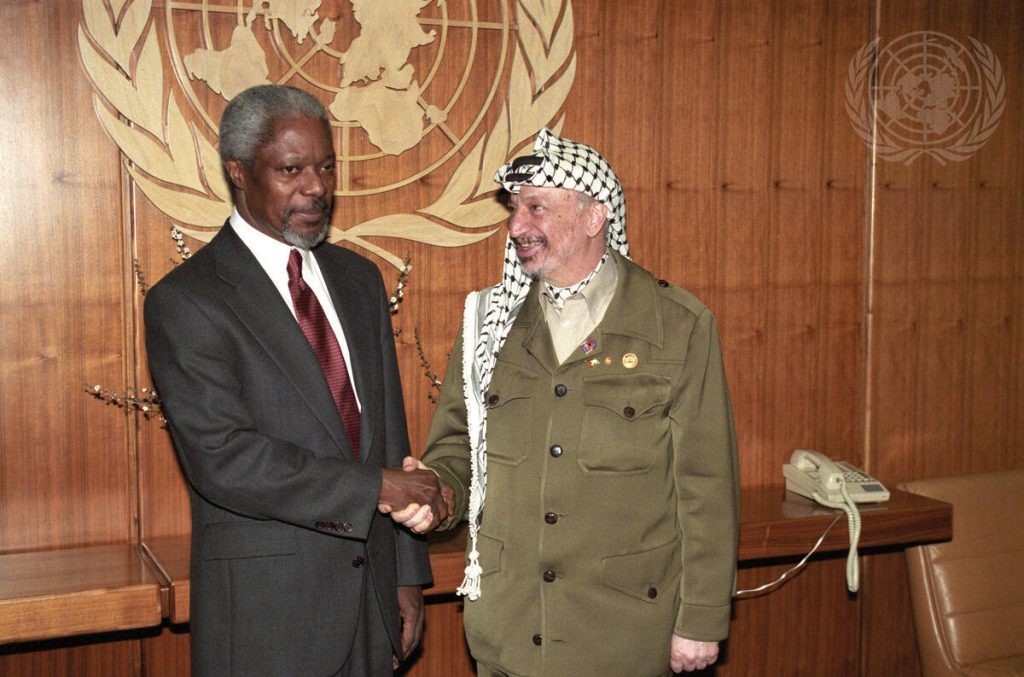
Their journey began from a distance—a gradual convergence of minds and convictions. Arafat became aware of her through her articles, poetry, interviews, and active political and cultural engagements. She emerged as his unwavering voice, his silent envoy, and his unyielding defender in various moments of struggle.
Her first direct encounter with Arafat happened upon Abu Jihad’s instructions, which led her to travel to Kuwait. There, she attended an event where she listened to Arafat’s speech, but that wasn’t enough for her. She turned to Azam Al-Ahmad, a senior Fatah leader, and insisted:
“Take me to Abu Ammar again.”
Azam introduced her formally, saying:
“This is Hanan Awwad.”
Arafat warmly welcomed her, embraced her, and turned to Azam with a knowing smile:
“I knew Hanan before you did—I knew her through her writings before meeting her in Iraq.” Then, with a chuckle, he added,
“But I never imagined she was this delicate.”
After the event concluded, Arafat personally invited her to the presidential palace.
Hanan recalls the overwhelming joy she felt at that moment—the fulfillment of a dream she had long cherished:
“This was the day I had long wished for. Every time my wings fluttered to fly toward you, my steps outpaced the speed of lightning.”
With all the love of a mystic for her sacred knight, she confessed:
“If love has a definition, it begins with you. And if we are to exist within the fragrance of longing and the revelations of reality, then you are the one who has shaped existence itself—with all the grandeur of beauty whose light will never fade.”
And After a Moment of Silence and Reflection in the Presence of the Divine Knight…
I invoked the divine essence of love, presenting its absolute meaning with words inspired by celestial thought:
“O my father,” Rabi’a al-Adawiyya once whispered in divine supplication, her soul ablaze with devotion, longing, and luminous nostalgia:
“I love You with two loves—
A love of passion, and a love because You are worthy of it.”
But as for me, I love You with three:
A love for the homeland,
A love of passion,
And a love because You are worthy of it.”
His eyes welled with tears. I took the golden map of Palestine that had rested on my neck and placed it in his hands. In return, he gifted me a diamond ring, and with a solemn voice, he entrusted me to his special care (pp. 212–213).
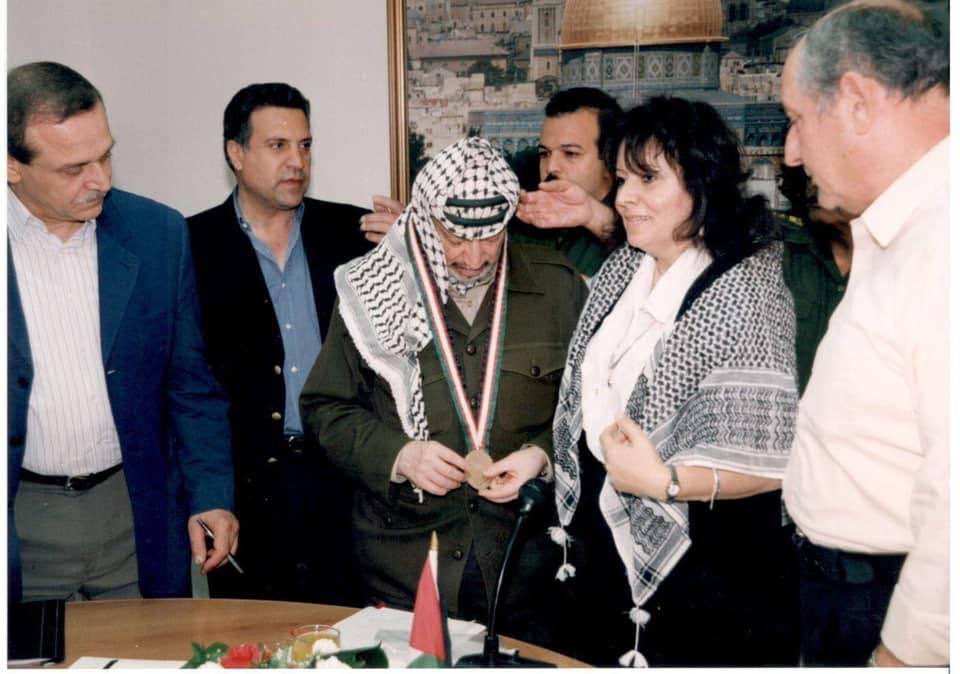
A Love Written in Sand
At another encounter, he asked me about my life. Was I bound to someone?
I lowered my head, my eyes flickering with the mystic glow of whispered prayers, and replied:
“As long as you remain unattached, I shall be the same.”
Then, I asked him,
“Who will love me with the love of prophets?”
And I continued,
“O Prophet who has loved me and believed in me, I promise you nothing but loyalty.
Ours is a love inscribed upon the sands, in the deserts of exile—untested, unbroken, and beyond repetition.
Perhaps it was created for us alone, just for us.
It does not fade with time, nor with the silence of the world.
It is our hidden divine secret, unseen by others—
For the sands reshape beneath the raindrops, only to reform the circles of love,
Painting its portraits anew.”
He fell silent, his gaze lingering upon me, glowing with boundless tenderness (p. 249).
A Love Bound by the Sacred Trinity—Rabi’a, the Knight-Prophet, and the Homeland
This profound and mystical love soared within the realms of Sufism, uniting the sacred trinity—Rabi’a, the knight-prophet, and the homeland in an unparalleled fusion. Yet, its tragic end came swiftly and mercilessly, leaving behind wounds too deep to heal. They became victims of a global conspiracy, orchestrated by all.
“Time was no longer gray—it was now shrouded in black,” Hanan writes (p. 397),
“No sound could be heard but the footsteps of the occupier.
Tanks advanced toward the Muqata’a,
Golani brigades moved toward the presidential headquarters.
The roads groaned under the weight of armored carriers and the heavy steps of soldiers.
The scenes were beyond belief.
The roar of tanks grew louder,
The grinding of chains against the Muqata’a’s soil carried the echoes of destruction.”
The siege tightened and dragged on, leading Hanan to pose the agonizing question:
“What can a besieged leader do
Against a program of annihilation and displacement?
Against the absence of a true revolutionary force in the world?
Against the collapse of the Arab stance?” (p. 412)
The deliberate silence of Arab leaders was shocking and alarming.
In anguish, Hanan cries out:
**”Where are the thinkers and intellectuals?
Where are the committed writers who once carried their souls in their hands?
Where is the word?
Have the pure poets disappeared,
The novel scattered,
The tale poisoned?
Has falsehood been crowned
And carried upon the trembling ladders of fear?
Where are the leaders, the sovereigns?
Where is certainty?
The comrade has vanished,
The friend has disappeared,
The voices of rulers and presidents have faded,
And the game of silence has begun.
What happened was not a legend conjured by visionaries,
Not a nightmare glimpsed in our dreams,
Not a fable passed down to us—
But a reality, stark and raw,
Laid bare upon our land.”** (p. 440)
The Eternal Farewell
Like everyone else, Hanan could never conceive of illness or death drawing near to President Yasser Arafat.
“We always denied his illness. The thought of losing our leader never crossed our minds, despite our awareness of the nature of life.
To us, he was eternal, immortal—untouched by pain or misfortune.
He always stood before us, towering, radiant with an everlasting glow, intertwined with glory.
It was the divine image we had drawn for him.” (p. 457)
And as the plane ascended into the sky, carrying the president on his final journey to Paris for treatment, Hanan wondered:
“Will our Palestinian knight return to us once more?” (p. 462)
But then came the end. The painful news arrived—Yasser Arafat had passed away.
The epic was over.
He was laid to rest in the sacred soil of Palestine, his illustrious chapter in history forever sealed.
And Hanan, watching the moment unfold with the grief of the bereaved, cried out to her departed knight, vanishing into the realm of no return:
“Do not leave,
Do not leave.
Grant us our pride in you,
Give us a few more moments,
Do not leave.”
As she saw his body lowered into the earth, the harsh reality struck.
Through her tears, she whispered her final farewell:
“Farewell, dearest man, the conqueror of the impossible.
Peace be upon you,
A man of miracles,
A presence,
An eternity,
A certainty of belonging.
You are reborn within us at every dawn,
With every wish,
So there shall be no farewell—
No farewell.” (p. 470-471)
The Dissolution of the Sacred Trinity
Thus, the epic of divine love came to an end.
The sacred trinity unraveled—
The knight disappeared into the abyss of absence.
The homeland remained shackled in the grip of occupation.
And Rabi’a the eternal lover continued to sing her Sufi hymns to her lost knight, hoping he might hear and return.
The Enigma of Hanan’s Narcissism
Hanan’s enigmatic and captivating self-love remained an enigma to many.
From the moment she became aware of life and confronted its bitter realities, from the moment she witnessed the suffering of her people and homeland, she chose her path.
She devoted herself to tracking the knight, the one cloaked in prophecy, who roamed from place to place, uplifting spirits and preparing the people for the battles ahead.
Even when she realized his departure, she clung to the hope of his return.
She lived her life in a state of anticipation and preparation, until, over time, he became her obsession, her preoccupation, and an inseparable part of her physical, spiritual, and intellectual existence.
She merged with him, dissolved into him, and forged a sacred covenant with him—
A covenant of love for the homeland, forming together the Holy Trinity.
A Life Defined by the Sacred Trinity
Hanan grew up with the absolute conviction that she was an inseparable part of the sacred trinity.
She had no identity without it, no future, no meaning.
Thus, she matured and strengthened, her mind expanding with knowledge, culture, and unwavering devotion.
She lived in admiration of herself, in adoration of her own existence, because in doing so, she unified with her returning knight and her united homeland.
She paid no heed to others’ remarks.
Their flattery and admiration meant nothing to her.
She lived within herself, immersed in her own unique narcissism, where she saw her returning knight and her promised paradise.
Her love for her knight was her love for her homeland.
Her love for both was her love for herself.
She once asked:
“Do we truly love?
Or do we merely love the reflection of ourselves in the other?”
She was never alone.
Within her, the sacred trinity intertwined—leaving no space for anything beyond herself.
She was whole, fulfilled, content.
In the completeness of her being, she saw her knight.
In her adoration of the prophet-like beloved, she saw herself.
In her homeland, she saw the paradise where they both belonged.
And so, her narcissism flourished, deepened, and consumed her entirely.
For in loving herself, she loved him.
In merging with him, she dissolved into the sacred trinity.
Thus, Rabi’a of Palestine continued to chant her divine hymns,
Singing to her beloved deity-knight,
Soaring with him into the paradise of eternity that embraced them both.
Hanan’s Narcissism: A Union with Her Beloved Knight
This is the narcissism of Hanan Awwad, as she merges with her beloved knight, who both adores and is adored by her.
As she herself admits, her narcissism began as a delicate bud, growing into a towering tree with lush branches. (p. 484)
Hanan reflects:
“This is how my philosophy of love was formed—
A pure, Sufi love, boundless in its horizons as I envisioned it.
In the presence of the soul,
In the reflection of desire, perfumed with the fragrance of a spirit sanctified in its own essence,
We come to understand that love is a divine message, woven with silken threads.”
The Mastery of Language and Thought
Hanan’s intelligence and keen insight shine through in her elegant, refined, and captivating language.
She mastered the art of weaving words and expressions,
Employing metaphor and allusion,
Revealing and concealing at will,
Inviting curiosity, prompting reflection,
Leading the reader into an endless search for the hidden meanings behind seemingly simple words.
She retained her independence and strength
In every gathering, debate, and encounter—
Even when many of the influential and intellectual men she met
Sought to draw her closer and win her favor.
Yet, with the instinct of a woman, she understood:
A man, no matter his intellect or status, remains a man in how he views a woman.
One day, a prominent and distinguished figure asked her with a mix of admiration and persuasion:
“You are a delicate poet, a profound thinker, and—above all—a woman of complete femininity.
Why do you drown yourself in politics and set aside the woman in you?”
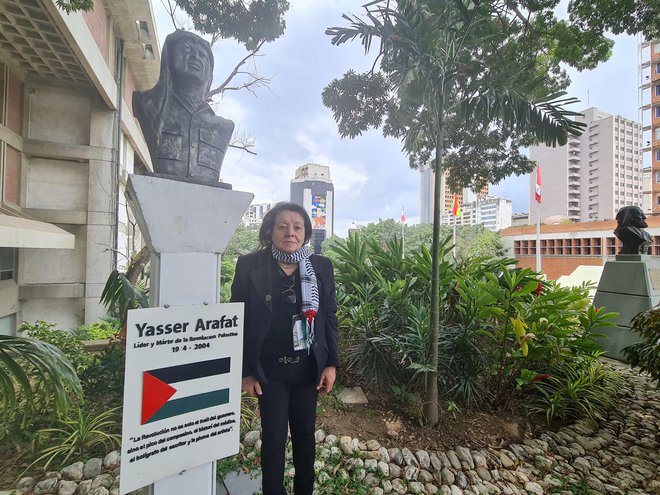
Hanan responded with a passionate defense of her homeland and the necessity of sacrifice for its cause.
But he remained unconvinced and repeated his remark in another conversation.
She recounts:
“My responses were always diplomatic, symbolic.
I cloaked them in philosophical vision,
In the intellectual theories I had spent time exploring,
And in my own perception of femininity—
A perception that remained inseparable from my revolutionary path
And one that I preserved throughout my journey.”
She continues:
“In truth, many of my friends made similar remarks, whether directly or subtly.
They recognized the refined essence of femininity in my intellect, in my humanity, and in the depth of my sensitivity.
Yet, I was always mindful of my responsibility—culturally and humanly—
I ensured that my presence extended across vast horizons,
Engaging with countless intellectuals and politicians,
While keeping the spirit of the woman within me untouched by any tarnish.
My commitment was to the power of words, to enlightened dialogue, to the pursuit of knowledge.
I loved thought, profound discussions, and human philosophy,
And I built my relationships on this solid foundation of intellectual exchange and deep, sincere friendships.” (p. 280-281)
A Shield Against Vanity and Entitlement
One cannot overlook Hanan’s unique and privileged relationship with Abu Jihad and, especially, President Yasser Arafat.
He ensured her protection, fulfilled her every need, and provided her with unwavering care and support.
This served as a shield—a deterrent against anyone who presumed himself a knight or a Don Juan.
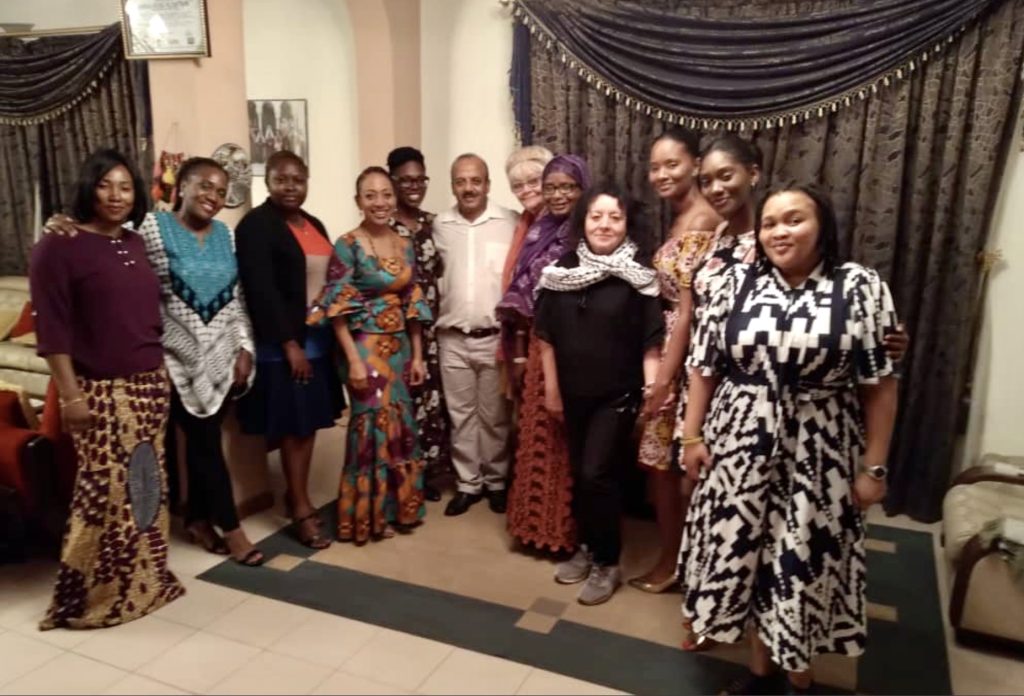
………………….

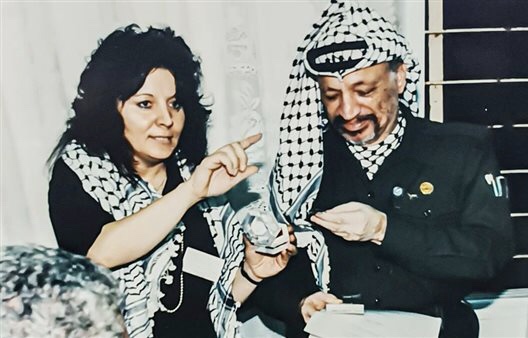
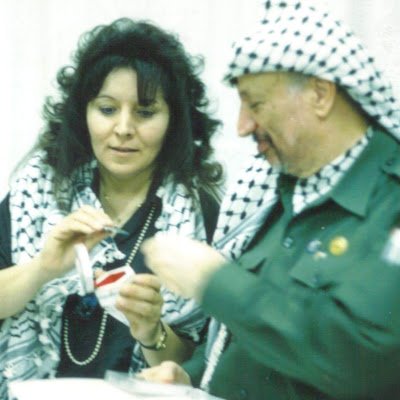
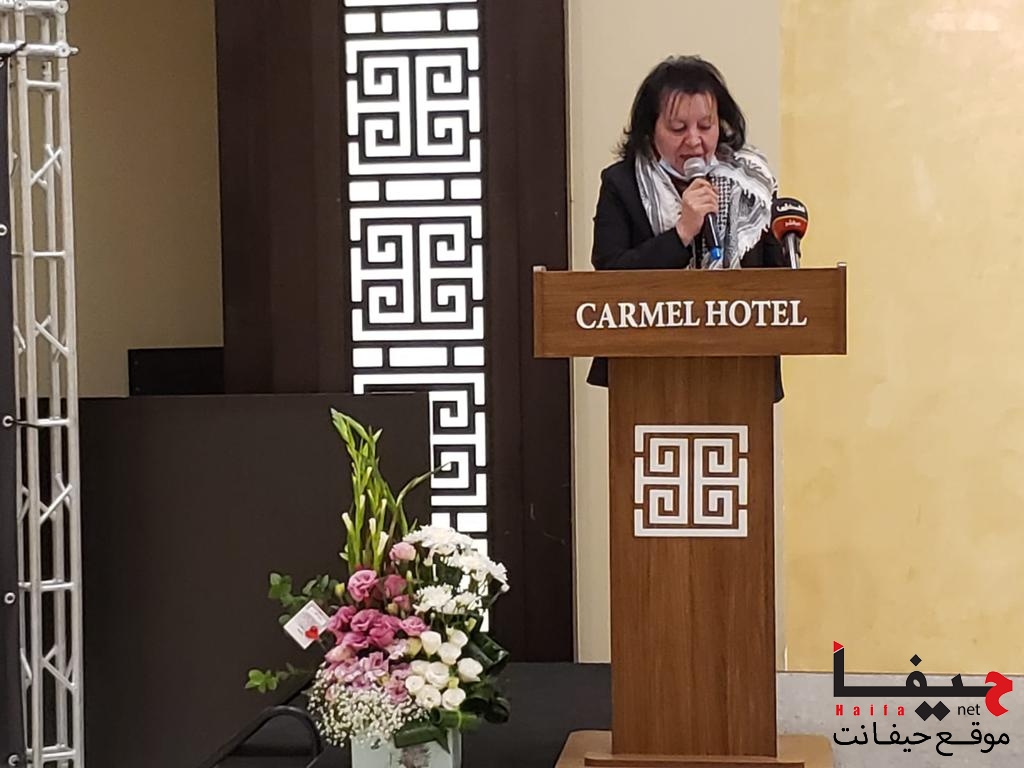
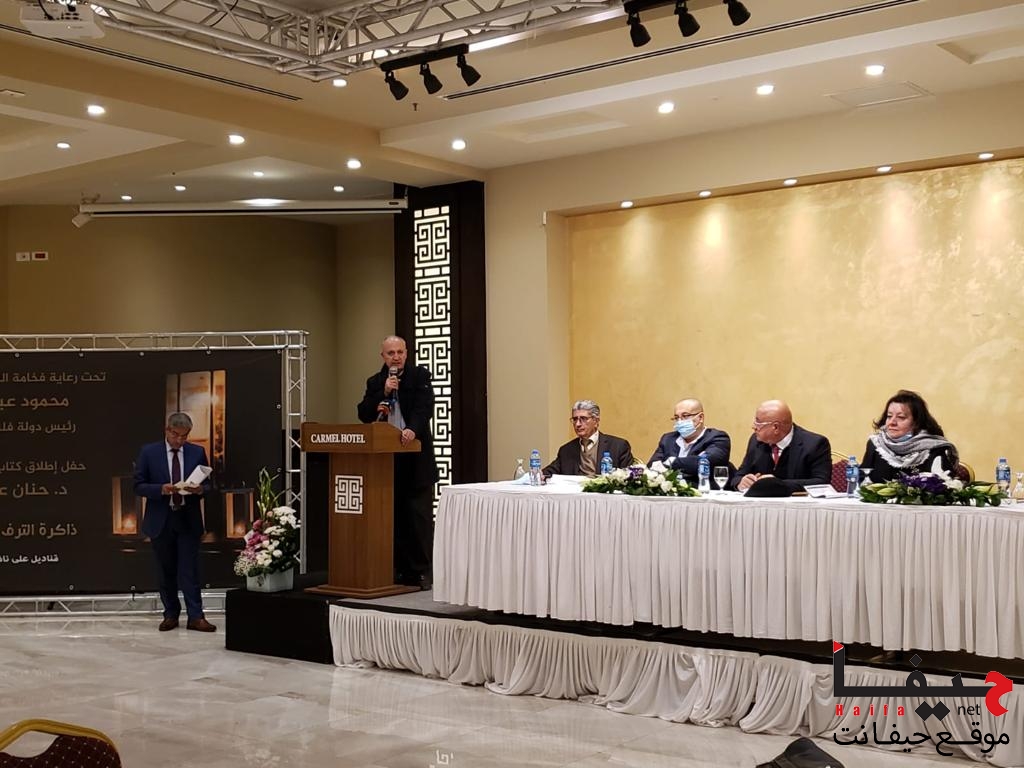

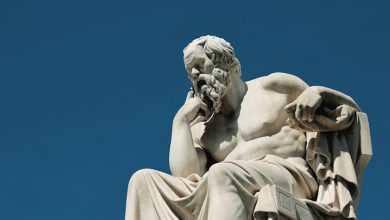
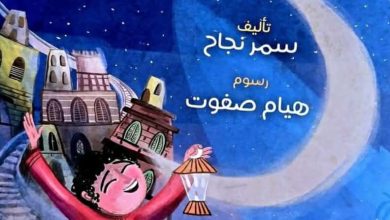
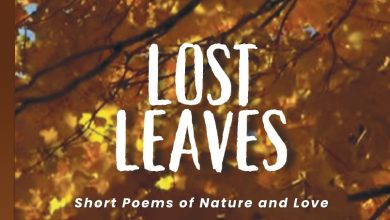
كيف أستطيع الحصول على نسخ من هذا الكتاب؟؟